
Christmas dinner is traditionally associated with roast turkey and all the trimmings. But have you ever considered going plant-based for your festive meal? There are plenty of vegan and vegetarian Christmas recipe ideas which will not only benefit your health but also the environment. Let’s take a look at some of the reasons why you should consider a plant-based Christmas feast this year.
Why is plant-based the better option?
In 2021 a Vegan Society survey revealed that 20% of respondents were planning to have at least one vegan meal during Christmas. Furthermore, 24% of respondents said that their decision was prompted by concerns about climate change.
So, how can switching to a plant-based diet help the environment? For a start, it helps to reduce carbon emissions. According to the Vegetarian Society, the farm-to-plate food production process adds up to 26% of all global greenhouse gas emissions. The Vegan Society reveals that meat and egg consumption represents the largest share of food supply emissions in EU countries. Figures range from 49 to 64%, with dairy products representing 16 to 36% of dietary emissions.
Is it time to ditch the turkey?
But what difference does one Christmas dinner make, you might ask? Well, a 2018 study found that a turkey dinner produces double the amount of carbon emissions of a vegan nut roast. And it’s not just the environment that is affected: your waistline could take a hit too. According to research, the average person consumes a whopping 5,373 calories during a traditional Christmas Day feast. That’s a lot of calories for one meal!
Plant-based diets are linked with a lower cardiovascular disease risk, can help reduce your cancer risk and may prevent diabetes. Plants are an excellent source of vitamins and minerals, phytochemicals and antioxidants. These help to support the immune system and fight inflammation, which lies at the heart of a lot of disease. So, this year, perhaps it’s time to ditch the pigs in blankets, potatoes roasted in goose fat and meaty gravy. Read on for some inspiration on how to cook up a delicious and healthy plant-based Christmas dinner.
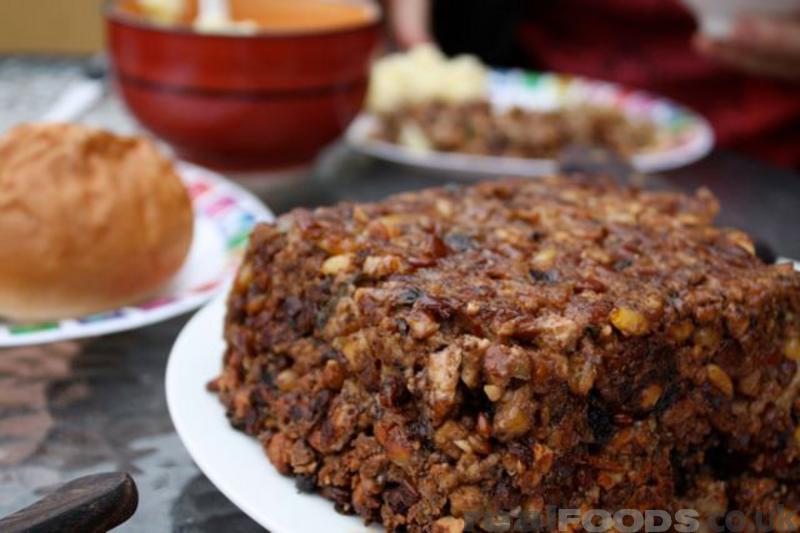
Plant-based Christmas centrepieces
Nut roast
Nut roast is the classic main meal for any plant-based Christmas dinner. It’s almost as synonymous with Christmas as turkey is for meat-eaters. This Vegan Nut Roast recipe combines cashews, pecans, almonds and hazelnuts with lentils, tofu and vegetables. The nuts are a great source of antioxidants, fibre, and nutrients such as vitamin E, magnesium and selenium. The tofu is a good plant-based source of protein as well as nutrients such as calcium, magnesium, phosphorus, B vitamins, and iron.
This 5 Nuts Roast with Herb Stuffing is a simpler option, but just as tasty and nutritious. It works well with a wild mushroom gravy and can be made gluten-free by using gluten-free bread and breadcrumbs.
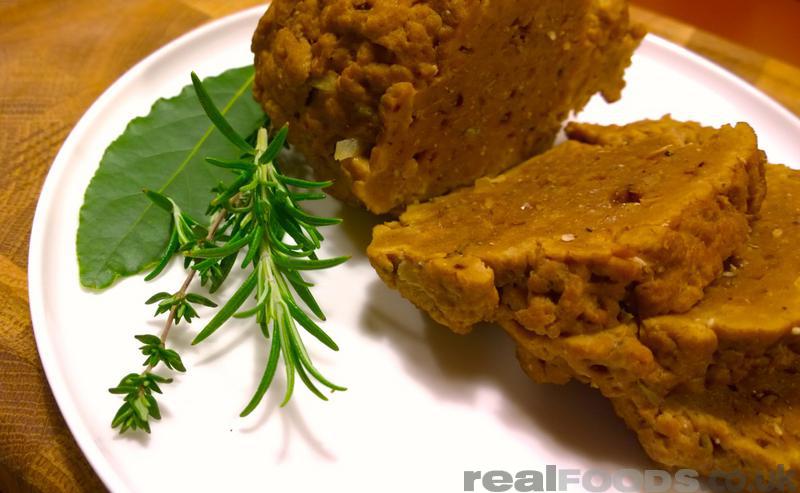
Seitan
An alternative for your plant-based Christmas meal is this Protein-rich Homemade Vegan Seitan recipe, which makes a great centrepiece. Our version is simply flavoured with garlic powder, chilli powder, nutritional yeast and mixed herbs. As it takes the form of a loaf, you’ll still have something to slice at the dinner table. And, what’s more, you can use the leftovers in sandwiches on Boxing Day. Who needs turkey?
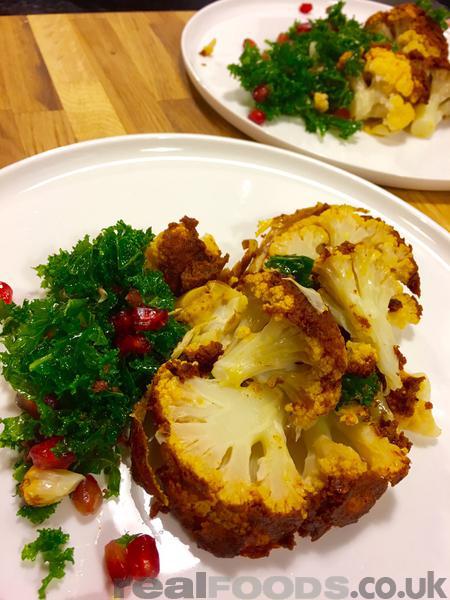
Roasted cauliflower
For something really different with a kick of spice, why not try this Whole Roasted Spiced Cauliflower recipe? Not only is it plant-based, but it’s also gluten-free, grain-free and nut-free, so suitable for anyone on a free-from diet. The raw, wilted kale and pomegranate salad really complements the flavours. Kale is a nutritional powerhouse and a great source of vitamins A, K, B6 and C, calcium, potassium, copper and manganese. This could be your healthiest Christmas dinner yet!
Show-stopping Christmas side dishes
Brussels sprouts
Once you have decided on your plant-based main course, you’ll need some side dishes to serve with it. Brussels sprouts are frequently associated with Christmas dinner but not everyone is a fan of them! A cup of Brussels sprouts contains 24% of your daily recommended amount of vitamin A and is a great source of fibre, vitamin C and vitamin K. A traditional way of serving Brussels sprouts at Christmas is with bacon or pancetta, but why not try our recipe for Brussel Sprouts and Chestnuts with Pomegranate Molasses instead? The pairing of chestnuts with the sprouts adds a deliciously nutty flavour and provides a great source of antioxidants, fibre and potassium.
If you’re struggling to get hold of pomegranate molasses for this recipe, then you can use maple syrup as an alternative, like in this suggestion. If you’re not a fan of chestnuts, then you could replace them with pre-cooked chickpeas which are just as chewy and satisfying. Chickpeas also have a lovely nutty taste, which goes well with the sprouts, and are a good source of protein and fibre.
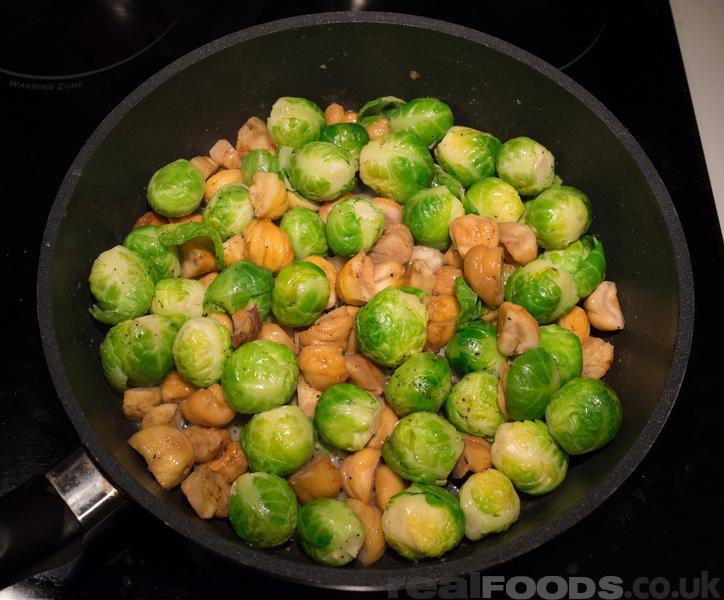
Roast potatoes
Roast potatoes are one of those crowd-pleasing side dishes that will keep everyone happy, whether they are vegetarian, vegan or meat-eaters. Our recipe for Roast Potatoes with Red Bell Peppers is a colourful and nutritious twist on a festive favourite. The potatoes are rich in vitamin C and potassium, while the red peppers are an excellent source of vitamins A and C. Top tip: try seasoning this dish with some gomasio, which is a condiment made from sesame seeds and salt. Gomasio contains a ratio of sesame seeds to salt that is typically between 5:1 and 18:1, so it’s a good low-sodium option.
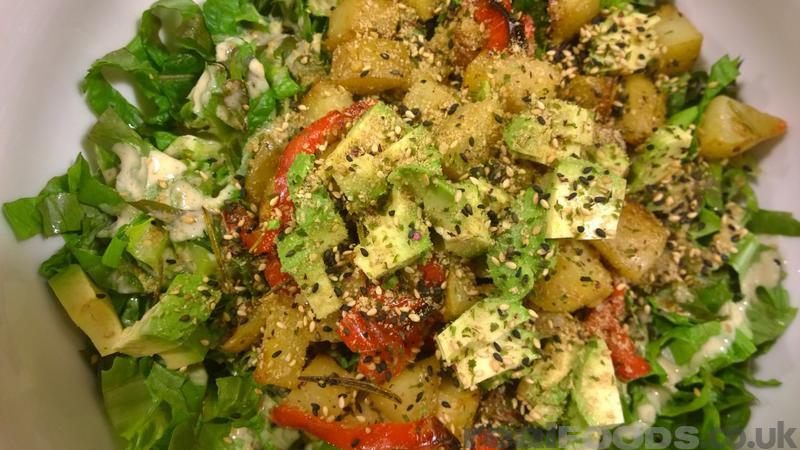
Salsify
It’s always good to incorporate seasonal vegetables into your diet, and a great vegetable for this time of year is salsify. In season from October to January, this root vegetable is known as the ‘oyster plant’ because it has a similar taste when cooked. This recipe for Roasted Carrots and Salsifies is a fantastic festive pairing and full of nutrients such as fibre, vitamin C and iron, plus added vitamin A from the carrots. The addition of garlic, bay leaves and thyme brings out the flavours of the veg and works perfectly with a nut roast. The skins of salsify are edible, so keep them on for an extra nutritional boost. But if you prefer to peel them, be sure to soak them in cold water with some vinegar to stop the flesh from turning brown.
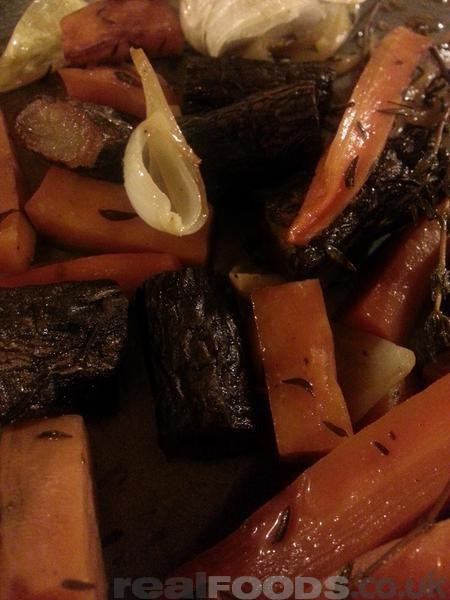
Decadent plant-based Christmas desserts
Poached pears
Think of a traditional Christmas dessert and you’ll probably think of Christmas pudding, mince pies and Christmas cake. Whist undeniably tasty, these festive treats are unfortunately high in fat and sugar and are pretty calorific. One mince pie contains approximately 240 calories, whilst a serving of Christmas pudding comes in at around 350 calories.
This recipe for Saffron Poached Pears makes a delicious alternative festive dessert and it’s a lot lighter on the sugar and fat. Pears are a good source of fibre and are also high in vitamins C and K, as well as antioxidants. Saffron is also high in antioxidants, so you get an extra nutritional boost from this recipe. Once you have finished poaching the pears, you can use the poaching water in a smoothie. It’s an additional way of getting some of the nutrients and saves on waste.
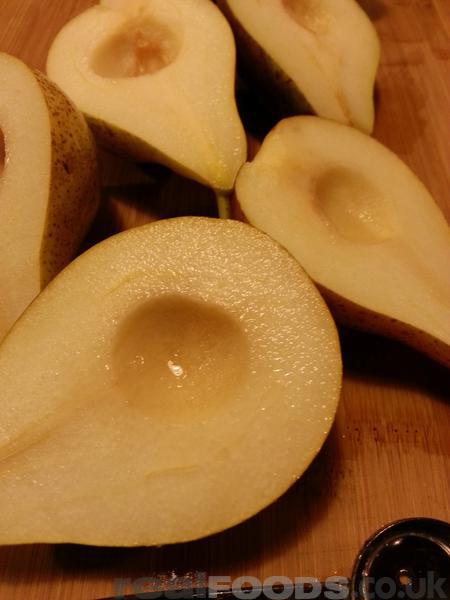
Christmas pudding
Christmas pudding is traditionally made with sugar and suet and isn’t a particularly healthy dessert! Suet is a non-vegetarian and vegan saturated fat which is sourced from the kidneys of animals (mostly cows and sheep). Consuming too much saturated fat can lead to raised LDL or ‘bad’ cholesterol, which can increase the risk of heart disease and stroke. Eating too much sugar can lead to weight gain as well as health problems such as and type 2 diabetes.
Vegetable suet and vegetable shortening can be used instead of suet, to make a plant-based Christmas pudding. Take a look at our Vintage Christmas Pudding recipe, which is vegan, fat-free and contains no added sugar. Straight out of the Real Foods archives, we used to give this recipe out to our customers in the 1970s. It’s really stood the test of time! Instead of sugar, the sweetness comes from the apple juice, the dried mixed fruit and the spices. Prepare it in advance, store in a cool place and steam it before serving on Christmas Day. It goes particularly well with our Vegan Brandy Nut Butter, which is another vintage favourite from our archives!
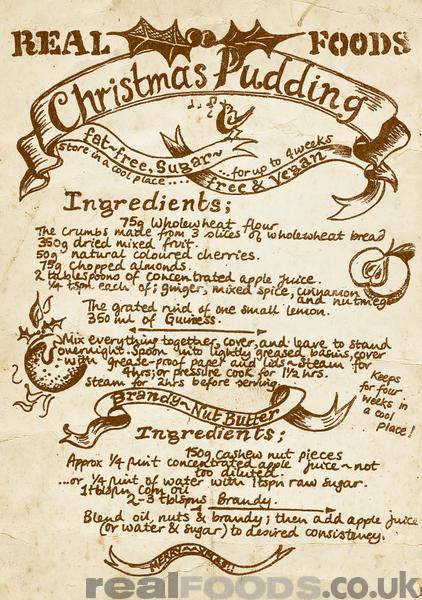
Guiness in recent years changed their production processes to make their product vegan.
Hopefully this blog post has provided you with some inspiration for delicious and healthy vegetarian and vegan Christmas dishes. We are sure that even the most ardent meat-eater will enjoy these festive feasts! For more recipe inspiration, take a look at all of the Real Foods Christmas recipes here. When shopping for your ingredients, be sure to check out the wide range of organic, vegan, vegetarian and fair-trade foods available from Real Foods.
This year, we hope you have yourself a merry plant-based Christmas!







